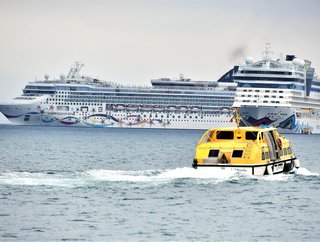Could Schneider’s Offshore Charging Transform Shipping?

For several years, concerted efforts have been to reduce carbon emissions within the maritime industry.
But only now has a solution been proposed that could truly transform the shipping industry forever.
Schneider Electric, the leader in the digital transformation of energy management and automation, has joined a collaborative effort to develop and deliver the first cold-ironing buoy designed to power ships at anchorage.
Led by Orcades Marine Management Consultants, the project is initially aimed at reducing emissions from cruise ships anchored at the Bay of Kirkwall in the Orkney Islands off the coast of Scotland.
The solution is set to reduce the amount of pollution ships produce while idling off-shore, improving air quality near the shoreline.
Providing energy from renewable sources
While cold ironing is already widely available for ships at berth, no solution currently exists to provide it for ships at anchorage.
The cold-ironing buoy developed by Schneider will provide energy from nearby renewable sources including wind turbines, solar PV and tidal turbines to charge hybrid cruise ships and meet their significant energy needs.
The initial project, which has received around US$375,000 in funding from the UK Government’s Department for Transport, will involve front-end engineering and design (FEED), alongside a comprehensive feasibility study looking at the technical, economic and social impacts of the technology.
Once complete, work will commence to build the cold-ironing buoy, which will itself be powered by an onshore power supply (OPS) through a subsea cable to the anchorage point.
As a key technical partner, Schneider Electric is helping to establish the technical and commercial viability of the project, supporting with a gap analysis and the pre-FEED for the infrastructure upgrade.
The firm will also assess the project’s technical, economical and operational feasibility and create an adoption roadmap for the pilot demonstration.
“There has been an increasing drive to reduce emissions in the maritime industry in recent years,” comments Shaun Faulkner, Seaport Segment Lead at Schneider Electric. “We’re proud to play a part in this move to greener shipping.
“As an organisation, our purpose is to make sustainability accessible to all and to empower everyone to make the most of our energy and resources. There is an increasingly clear need for cleaner and more sustainable processes and guidance in the ports and maritime industry.
“This project will be a positive step forward in terms of fulfilling that need and demonstrating what a more sustainable future could look like.”
Schneider part of expert consortium
As well as Orcades, Schneider is joined in a consortium by Orkney Island Council Harbour Authority, leading shipping agency GAC UK and environmental consultancy business Aquatera.
Each organisation brings a high level of experience and expertise in its own field, allowing for the delivery of a comprehensive project covering considerations relating to engineering, safety, harbour operations, environmental matters and beyond.
The Bay of Kirkwall was carefully selected as the location for the project due to its popularity as a cruise ship destination and potential to produce renewable energy. Since 2013, Orkney has generated more than 100% of its electricity demand from renewable sources.
“I'm thrilled to announce our successful grant award from the Department for Transport,” adds Captain David Thomson, Managing Director of Orcades Marine.
“Our aim is clear: to eliminate carbon emissions from some of the largest ships within port limits. This project marks a significant step towards a cleaner, more sustainable maritime future, and we're committed to driving innovation and positive change in the industry.”
******
Check out the latest edition of Supply Chain Magazine and sign up to our global conference series – Procurement and SupplyChain LIVE 2024.
******
Supply Chain Digital is a BizClik brand






